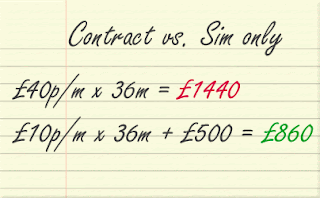Mobile phones are an important part of modern living and it's difficult for many of us to imagine life without one, but with contracts costing an average of 240 pounds a year it's important to make sure you're the one calling the shots and that you're not paying for more than you need.
Shop around
The mobile phone industry is a highly competitive market and there are deals to be had. It's worth taking the time to price-compare between at least three different providers. While looking for the best price be sure to take into account the duration of the contract as well as the allowances.
Think carefully before tying yourself down to a long term contract. Contracts for 24 months or more are not uncommon, and once you've entered the agreement it will be difficult to escape from without incurring a financial penalty. Some crystal ball gazing is required: you'll need to think about your long-term financial prospects and whether or not you can comfortably afford the contract you're considering, even if your circumstances were to change.
Sim only deals
The cheapest deals available are contracts on a 'sim only' basis: in other words, the phone's not included. As one example, Virgin Media offer a sim-card with 100 minutes and unlimited texts for just 5 pounds month you're an existing customer for their tv and broadband, or 7.99 if you're not.
There are a multitude of deals available of the 'sim only' variety offering varying allowances of talk-time minutes, texts, and internet data. Be realistic about how much of each allowance you're going to need, but be careful not to go too low: the charges for exceeding any given allowance can be extortionate.
A survey carried out recently revealed that 1 in 5 iPhone owners are in debt. Indeed, the newest bit of kit is always a temptation and it's one that you may have to avoid. If you're on a 'sim only' contract, there is no shiny new phone included, so you have two choices:
- Buy an unlocked phone; or
- continue using your existing phone with your new sim-card (you may need to get it unlocked).
The maths
If you're particularly frugal you could buy a budget phone. Manufacturers such as Alcatel produce perfectly functional handsets at very competitive prices. If, however, you want something a little more upmarket, there are a range of handsets available ranging from around 50 to 500.
If you're particularly frugal you could buy a budget phone. Manufacturers such as Alcatel produce perfectly functional handsets at very competitive prices. If, however, you want something a little more upmarket, there are a range of handsets available ranging from around 50 to 500.
Before you set your heart on a handset, it's important to look at the numbers. Let's compare a 500 phone on contract with a 500 pound phone bought for a 10p/m sim only deal:
Of course, the disadvantage to this method - although saving a great deal of money in the long-run - is the initial expense of the phone as a single lump sum. If, however, you are realistic about what you want and need from a mobile-phone it shouldn't be difficult to find a handset that does all you need it to and falls within budget.
Haggling
Loyalty may not be quite the bargaining chip it used to be, but the vast majority of companies are still prepared to jump hurdles if it means keeping you on-side. The mobile phone industry is especially competitive which makes haggling for a better deal that little bit easier. The thing to remember is if you don't ask, you don't get.
 Remember that you can only negotiate at the beginning or end of a contract agreement - if you attempt to leave in the middle of a contract you can still be held liable for the remainder of the fees or a termination charge.
Remember that you can only negotiate at the beginning or end of a contract agreement - if you attempt to leave in the middle of a contract you can still be held liable for the remainder of the fees or a termination charge.
 Remember that you can only negotiate at the beginning or end of a contract agreement - if you attempt to leave in the middle of a contract you can still be held liable for the remainder of the fees or a termination charge.
Remember that you can only negotiate at the beginning or end of a contract agreement - if you attempt to leave in the middle of a contract you can still be held liable for the remainder of the fees or a termination charge.
Before you make the call, it's important that you're clear on exactly what it is that you want and at what price. Being able to refer to a similar offer advertised by a rival phone company will go a long way in strengthening your argument, but it's not essential.
When you make the call, your aim is to convince them that you are planning to leave: this will require a little acting on your part. When they ask why you want to leave - and they invariably will - tell them that you feel it is too expensive for you to continue and that you've found a better deal elsewhere.
Instead of waiting for them to make you an offer, present your suggestion. Be realistic with your figures and be prepared to negotiate down if necessary, but don't back down too easily. It's likely that they will back down to your demands, particularly if you can cite the price you are suggesting from a competitor's deals.
If things don't go according to plan and they say that they are about to arrange cancellation, you can save face by saying "I'd like some time to think about it." and then hanging up the phone.
Conclusion
Don't let your phone call the shots, make sure you're getting the best deal for you. Only you can decide what kind of deal is most useful, but if you want to save money you must be realistic about what you actually need. Sometimes saving money can be as simple as asking your provider to charge you less (see Haggling).
When you make the call, your aim is to convince them that you are planning to leave: this will require a little acting on your part. When they ask why you want to leave - and they invariably will - tell them that you feel it is too expensive for you to continue and that you've found a better deal elsewhere.
Instead of waiting for them to make you an offer, present your suggestion. Be realistic with your figures and be prepared to negotiate down if necessary, but don't back down too easily. It's likely that they will back down to your demands, particularly if you can cite the price you are suggesting from a competitor's deals.
If things don't go according to plan and they say that they are about to arrange cancellation, you can save face by saying "I'd like some time to think about it." and then hanging up the phone.
Conclusion
Don't let your phone call the shots, make sure you're getting the best deal for you. Only you can decide what kind of deal is most useful, but if you want to save money you must be realistic about what you actually need. Sometimes saving money can be as simple as asking your provider to charge you less (see Haggling).





No comments:
Post a Comment